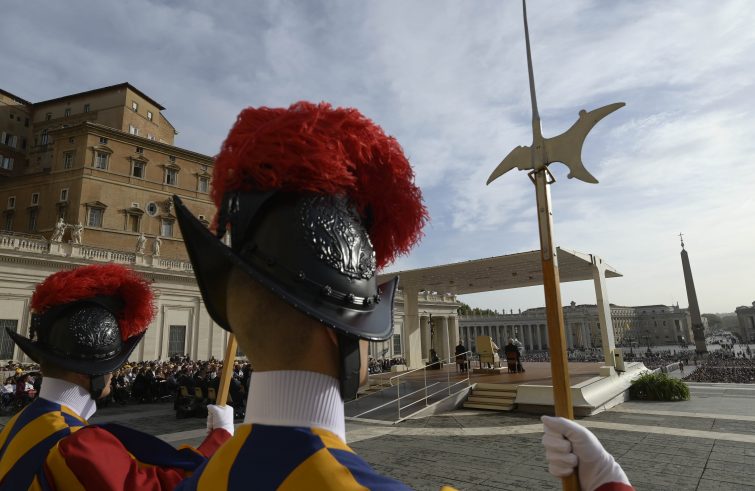
“We all have the temptation to wear a mask, even in front of ourselves”, Pope Francis denounced off-text during today’s general audience in St.Peter’s Square, devoted to an essential requirement of “good discernment”, that is “to know oneself.” “Coming to know ourselves is not easy”, Francis said, “it involves our human faculties: memory, intellect, will, affections.” “Often, we do not know how to discern because we do not know ourselves well enough, and so we do not know what we really want”, Francis warned: “Almost all of us hide behind a mask, not only in front of others, but also when we look in the mirror.” At the end of the audience the Pope made an umpteenth appeal to pray for peace in “martyred” Ukraine.
“Forgetfulness of God’s presence in our life goes hand in hand with ignorance of ourselves – ignoring God and ignoring ourselves – ignorance of our personality traits and our deepest desires.”
the Pope’s counsel: “Knowing oneself is not difficult, but it is laborious: it implies patient soul-searching. It requires the capacity to stop,
to ‘deactivate the autopilot’,
to acquire awareness of our way of acting, of the feelings that dwell within us, of the recurrent thoughts that condition us, and often unconsciously. It also requires that we distinguish between emotions and spiritual faculties.”
‘I feel’ is not the same as ‘I am convinced’; ‘I feel like’ is not the same as ‘I want’, Francis pointed out: “Thus, we come to recognize that the view we have of ourselves and of reality is at times somewhat distorted.” For the Pope, “To realize this is a grace! Indeed, very often it can happen that erroneous convictions about reality, based on past experiences, strongly influence us, limiting our freedom to strive for what really matters in our lives.”
“Spiritual life, too, has its ‘passwords’. The tempter, that is, the devil, knows these passwords well, and its important that we know them too, so as not to find ourselves where we do not want to be”,
Francis explained: “Temptation does not necessarily suggest bad things, but often haphazard things, presented with excessive importance. In this way it hypnotizes us with the attraction that these things stir in us, things that are beautiful but illusory, that cannot deliver what they promise, and therefore leave us in the end with a sense of emptiness and sadness.”
“That sense of emptiness and sadness is a sign that we have embarked on a path that was not right, that has disoriented us”,
Francis added departing from the written text: “They can be, for example, degrees, careers, relationships, all things that are in themselves praiseworthy, but towards which, if we are not free, we risk harbouring unreal expectations, such as confirmation of our worth.” From this misunderstanding “often comes the greatest suffering, because none of those things can be the guarantee of our dignity:” that’s why “it is important to know ourselves, to know the passwords of our heart, what we are most sensitive to, in order to protect ourselves from those who present themselves with persuasive words to manipulate us, but also to recognize what is truly important for us, distinguishing it from current fads or flashy, superficial slogans.” “Many times, what is said in a television programme, touches our hearts and makes us go that way without freedom. Be careful about that”, was the Pope’s counsel to the faithful. In the closing part of today’s audience Francis called on each one of us to ask ourselves: “am I free, or do I let myself be swayed by the feelings of the moment, or the provocations of the moment?”. “An aid in this is examination of conscience”, the Pope remarked: “I am not talking about the examination of conscience that we all do when we go to confession: A general examination of conscience of the day: ‘Lots of things happened…’. What traces did they leave in my heart? That is,
the good habit of calmly rereading what happens in our day,
learning to note in our evaluations and choices what we give most importance to, what we are looking for and why, and what we eventually find.” “Above all, learning to recognize what satiates the heart”; Francis recommended: “For only the Lord can give us confirmation of what we are worth. He tells us this every day from the cross: he died for us, to show us how precious we are in his eyes. There is no obstacle or failure that can prevent his tender embrace.” “The examination of conscience helps a great deal”, the Pope concluded off-text, “because in this way we see that our heart is not a road where everything passes without us knowing about it. Prayer and self-knowledge enable us to grow in freedom. This is to grow in freedom! They are basic elements of Christian existence, precious elements for finding one’s place in life.”











